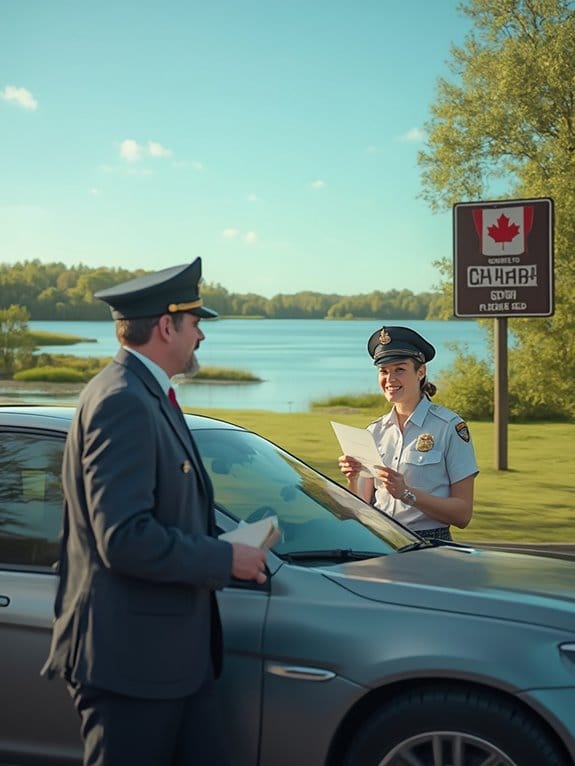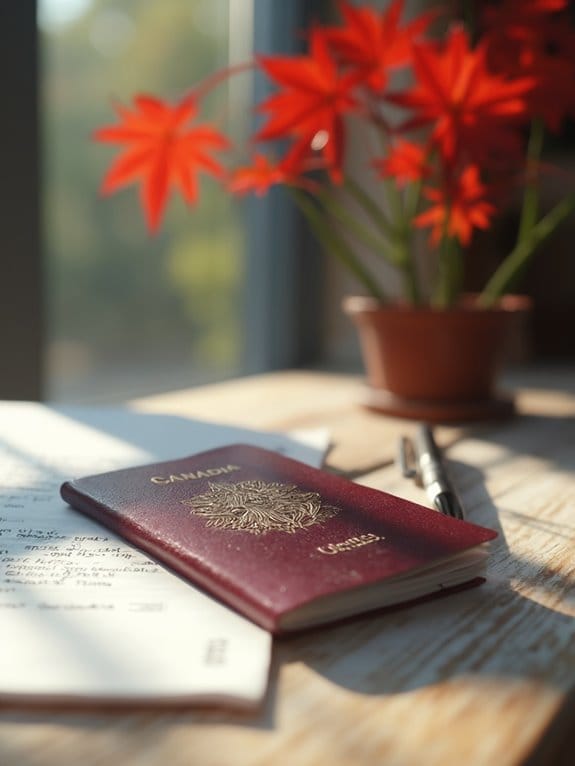Getting into Canada with a DUI is tricky, but don't sweat it; there are ways around it! First up, you can snag a Temporary Resident Permit or go for Criminal Rehabilitation if five years have passed since your sentence ended. If it's been ten years since a single DUI, Deemed Rehabilitation might be your ticket in. Just make sure you have all your documentation ready, like court records and police clearance. Consulting an immigration attorney can make the process smoother too. Don't forget to prepare for border checks—they're thorough! Stick around to see more tips and tricks for your Canada adventure!
Key Takeaways
- Apply for a Temporary Resident Permit (TRP) to gain temporary entry despite a DUI record by demonstrating a valid reason for your visit.
- Consider pursuing Criminal Rehabilitation if five years have passed since completing your DUI sentence and fines, as this can restore your entry eligibility.
- Explore Deemed Rehabilitation for a single DUI offense if ten years have elapsed since your sentence completion, provided the offense occurred before December 18, 2018.
- Gather and prepare necessary documentation, including court records and police clearance, to support your TRP or rehabilitation application effectively.
- Consult with a Canadian immigration attorney to navigate the complexities of DUI-related immigration issues and enhance your chances of successful entry.
Obtain a Temporary Resident Permit
If you're facing inadmissibility to Canada due to a DUI, obtaining a Temporary Resident Permit (TRP) could be your best option. This little document allows you to enter Canada temporarily, even if you've got a DUI on your record. Think of it as your golden ticket for those must-attend family events, business meetings, or even that long-awaited vacation!
Now, let's explore the TRP application process. You can submit your application at a Canadian consulate or right at the border if you're an American citizen or U.S. permanent resident. The cool part? If you go the port of entry route, you might get processed immediately! Just keep in mind the application fee is $229.77 CAD, and you'll need some supporting documents, like details about your DUI and proof that your trip is essential. Additionally, the TRP allows individuals with criminal inadmissibility to enter Canada temporarily for specific purposes.
As for the eligibility criteria, you'll want to show that your need to be in Canada outweighs any risks. So, if you can prove frequent travel or a compelling reason for your visit, you might just score that TRP and get back to enjoying what Canada has to offer!
Apply for Criminal Rehabilitation

Applying for Criminal Rehabilitation can be a crucial step toward overcoming your DUI-related inadmissibility to Canada, especially if you plan to visit for an extended period or frequently. You'll need to meet some eligibility criteria—specifically, at least five years must have passed since you completed your sentence, probation, and any fines tied to your DUI. Plus, the offense must have happened outside Canada.
The application process isn't too intimidating, but it does require some effort. Start by filling out Form 1444, then gather necessary documents like passport photos, background checks, and court documents detailing your conviction and its resolution. A personal statement about your arrest, letters of reference from friends or employers, and proof of why you want to travel to Canada will also help your case. Additionally, it's important to note that serious criminality may require a more complex application process and higher fees.
Don't forget to submit everything to a Canadian consulate, not at the border! It typically takes about 6-12 months, but sometimes longer if your case is more complex. Hiring a DUI entry lawyer can really boost your chances, making this process smoother and less stressful. Remember, you've got this!
Seek Deemed Rehabilitation

Best Ways To Enter Canada Despite DUI
Seek Deemed Rehabilitation
For those with a single DUI offense, seeking Deemed Rehabilitation can be a valuable pathway to regain entry into Canada. You'll need to meet specific Deemed eligibility criteria, like having at least ten years pass since you finished all your sentencing, probation, and paid any fines. And, remember, your DUI must've happened before December 18, 2018, to qualify. If you've got a single offense under your belt, you're in luck; multiple DUIs or more serious convictions won't cut it for this option.
Navigating the Rehabilitation application process might sound intimidating, but it's totally doable. First, gather proof that you've completed everything related to your sentence. Think about court records and maybe even a legal opinion letter from a Canadian immigration attorney to strengthen your case. It's like building a strong fortress around your eligibility! Additionally, it's crucial to be aware that successful cases often involve experienced immigration attorneys who can help you navigate the complexities of the process.
Don't forget, since the law changed in 2018, DUIs are now considered serious crimes, which complicates things if your offense was after that date. So, if you're among those eligible, seeking Deemed Rehabilitation could be your golden ticket back to Canada!
Prepare Necessary Documentation

Preparing the necessary documentation is essential for your journey back to Canada after a DUI. You'll want to complete the TRP application form (IMM 5708), where you'll detail your criminal history and explain why you wish to visit. Be sure to gather all your supporting documents, like court records related to your DUI and a police clearance certificate.
A personal statement is important, too; it should outline your rehabilitation efforts and justify why you should be allowed entry into Canada. Don't forget to include legal documents, such as court judgments, proof of sentence completion, and records of any rehabilitation programs you've undertaken.
If you're visiting for a specific purpose, include documentation like letters of invitation, travel itineraries, or business-related papers. Remember, the FBI background records will show DUI convictions indefinitely, even if they've vanished from DMV records. Additionally, it is advisable to understand the waiting periods that apply to your case, as they can significantly impact your eligibility for entry.
While having all this documentation is significant, keep in mind that border authorities have discretion and can still refuse entry. So, it might be wise to have a legal opinion letter handy. Good luck, and stay hopeful; you can do this!
Consult With an Immigration Attorney

When dealing with a DUI conviction and the complexities of Canadian immigration, consulting with an immigration attorney can be a game-changer. You might feel overwhelmed by the legal hurdles ahead, but having expert legal representation on your side can make a world of difference. These professionals specialize in managing immigration challenges, helping you understand how your DUI affects your eligibility to enter Canada.
Imagine sitting down with an attorney who assesses your situation and crafts a personalized strategy just for you. They'll guide you through the application process, whether you're applying for a Temporary Resident Permit (TRP) or seeking Criminal Rehabilitation. Plus, they know exactly what documentation you need to avoid any hiccups. Additionally, understanding the inadmissibility rules is crucial for navigating your entry options successfully.
Budgeting for these legal services is a smart investment. While there are application fees, the right attorney can greatly boost your chances of success. And let's be honest—having someone who can communicate directly with Canadian immigration authorities on your behalf can ease a lot of stress. So, don't hesitate! Reach out to a licensed immigration attorney and take that critical step toward a smoother journey into Canada despite your past.
Plan for Pre-Clearance at Consulate

Securing pre-clearance at a Canadian consulate can be an important step for those with a DUI looking to enter Canada. Imagine planning your perfect trip, only to be turned away at the border. That's where the pre-clearance benefits come in! By applying for a Temporary Resident Permit (TRP) or Criminal Rehabilitation at a consulate, you can get everything sorted before you even set foot in Canada.
First things first, you'll need to gather some documentation—like police reports, proof of completing your sentence, and any rehabilitation programs you've attended. It's all part of the consulate procedures. You might even want to include letters of invitation or travel itineraries to support your visit's purpose. Additionally, it's important to remember that a DUI conviction can lead to a 10-year entry ban, so addressing this proactively is crucial.
Keep in mind that timing is vital! For DUIs less than five years old, a TRP is your go-to. But if it's been a while, like ten years or more, you might be deemed rehabilitated just by the passage of time. Consulting with a Canadian immigration lawyer can make this process a breeze, ensuring you're well-prepared for your exciting adventure ahead. So, get that pre-clearance and enjoy your trip without the stress!
Understand DUI Classification in Canada

Understanding how Canada classifies DUI offenses is essential for anyone with such a conviction looking to enter the country. You see, in Canada, a DUI isn't treated lightly. It's classified as a hybrid offense, meaning it can be prosecuted as either a summary offense or an indictable offense, depending on the incident's severity. So, even if you think of your DUI as a minor hiccup, it could still pack a punch regarding DUI penalties.
Now, here's where the DUI implications come into play. A DUI conviction, even if it's just a misdemeanor in the U.S., can make you criminally inadmissible to Canada. Imagine showing up at the border, only to be turned away because of a past mistake! Under the Immigration and Refugee Protection Act, your DUI can be viewed as a serious crime, potentially equivalent to a felony. With the possibility of up to ten years in prison, it's no wonder that thousands of Americans face entry denials each year. Criminal inadmissibility can be temporary or permanent based on circumstances, but don't lose hope; you can still apply for special permission, like a Temporary Resident Permit, to get your foot in the door.
Address Pending DUI Charges

Facing pending DUI charges can complicate your plans to enter Canada considerably. You might think that since you haven't been convicted yet, you're in the clear, but that's not how Canadian immigration sees it. For them, pending charges are treated much like a conviction, which can lead to immediate inadmissibility. Yep, you read that right—just being arrested could stop you at the border.
So, what can you do? One option is to apply for a Temporary Resident Permit (TRP). This permit can help you cross the border, especially if you have urgent work or family matters waiting for you in Canada. It's crucial to act quickly, as the application process can take time. Additionally, consider that pending DUI charges may require proof of admissibility when challenged by the Canada Border Services Agency (CBSA).
Also, consider getting a legal opinion letter from a Canadian immigration lawyer. This letter can provide clarity on your situation, making it easier for border agents to understand your case. Remember, even if your charges are dropped later, that arrest could still shadow you at the border. Addressing these pending charges proactively can help you navigate the legal implications and avoid being turned away when you need to enter Canada.
Be Aware of Border Authority Checks

When trying to enter Canada, it's crucial to recognize that border authority checks can have significant implications for travelers with a DUI history. Imagine this: you're excited about your trip, but then you remember that border security has access to your criminal records. Yup, since 2015, the Canada Border Services Agency (CBSA) can access the FBI's database and county court records, making it super easy for them to spot any DUI convictions.
When you pull up to the border, agents scan your passport. This quick check can reveal any DUI implications that could lead to denial of entry. It doesn't matter if it was a minor offense or years ago; a DUI can still block your path into Canada. Additionally, the quick determination process by border agents means that you may not have much time to explain your situation. And don't think you're safe if you're just a passenger—everyone gets screened.
Provide Proof of Completed Sentence

After completing your DUI sentence, including any probation and fines, it's vital to gather the necessary documentation to prove your compliance. Trust me, you don't want to be caught off guard at the border. Start by collecting all relevant DUI documentation requirements—court documents, police certificates, and driver abstracts are key pieces of evidence. This paperwork is essential for showing that you've fulfilled your obligations.
Now, keep in mind there's a waiting period of five years after your sentence ends before you can apply for Criminal Rehabilitation. This timeline starts after your probation or any license suspension wraps up, whichever takes longer. If it's been over ten years since your DUI conviction and you don't have any other disqualifying offenses, you might be in luck! You could be deemed rehabilitated without needing to jump through additional hoops. Additionally, since the post 9/11 security measures were implemented, it's important to ensure that your records are current and accurately reflect your legal status.
Frequently Asked Questions
Can I Enter Canada With a DUI if I'm Traveling for Work?
Wondering if you can still travel for work despite a DUI? The DUI implications can complicate your entry into Canada, but options like a Temporary Resident Permit might be available to facilitate your work travel.
How Long Does the TRP Application Process Typically Take?
TRP processing times usually range from 3 to 6 months at a consulate, while applications at ports of entry can be processed within an hour. Make sure you meet all application requirements for smoother processing.
Will Canada Recognize My DUI if It Was Expunged?
Canada may still recognize your DUI even if it's expunged. DUI expungement implications can complicate Canada entry requirements, so you should have documentation ready and possibly consult an immigration expert for guidance.
Are There Specific Fees for Applying for Criminal Rehabilitation?
Yes, there're specific fees for the rehabilitation process. You'll need to pay CAD $239.75 for non-serious crimes and CAD $1,199.00 for serious ones, along with other application requirements like legal fees for assistance.
Can I Appeal if Denied Entry at the Canadian Border?
If you've faced a border denial, you can appeal that decision. Explore entry options like applying for criminal rehabilitation or a Temporary Resident Permit, which may help you re-enter Canada despite past issues.





